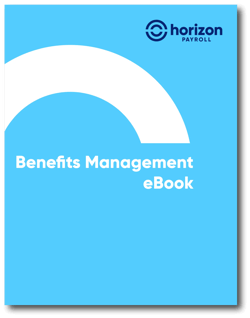When It’s Time to Switch: Common Payroll Situations
Handling payroll on your own can work for a while. A spreadsheet here, a manual tax update there, a few extra hours at...
Expert payroll management services with a personal touch.
View Solution Read Guide HR Support
HR SupportSimplify and personalize HR with a team of HR experts on-demand.
View Solution Read Guide Time & Attendance
Time & AttendanceWhy spend more unnecessary time and money managing your workforce?
View Solution Read Guide Hiring & Onboarding
Hiring & OnboardingTurn your candidates into employees with hiring & onboarding solutions.
View Solution Read GuideAdd On Solutions automate everyday tasks, prevent mistakes, and simplify business compliance.
View SolutionHelpful downloads and eBooks to empower your business.
Helpful tax and HR alerts to help keep your business compliant.
Payroll and tax-related forms and documents.
Horizon's blog provides valuable insight into payroll, compliance, human resources, and more.
See our client success stories for a case study on how we can help your business.
Payroll and HR strategy requires intelligent technology, personal attention and specialized expertise in the needs and nuances of your business.
We provide payroll and tax processing services for businesses from 1 to 1,000 employees or more. Today, we have nearly 1,000 customers in 40 states.
Benefits Solutions | Guide
Employee benefits are incentives offered by employers that complement wages to improve morale, retain key workers and attract qualified candidates. These benefits can be tangible or intangible, and they are offered to make the workplace more pleasant, provide security and promote employee wellbeing.
Moreover, when the Society for Human Resource Management surveyed workers about the importance of benefits, 92% of them said that these perks improved their overall job satisfaction. That’s telling in times of the Great Resignation.

Employers offer benefits because it is difficult to succeed in the current business environment without a motivated and enthusiastic workforce. Multiple studies show that employees who feel neglected or taken advantage of do not perform as well as workers who feel valued and appreciated. Also importantly, attracting and retaining high caliber talent in a competitive industry is extremely difficult without an attractive benefits package.
Benefits can improve employee well-being and satisfaction in several ways. Workers covered by comprehensive health plans do not have to worry about being left destitute by medical bills, which eliminates the gnawing fear that a minor accident or fall could lead to financial ruin. Offering benefits that relieve stress and promote well-being can really influence a company’s bottom line. According to SHRM, offering benefits increases performance by as much as 58%.
Offering benefits can make it far easier to attract qualified and capable job applicants—even benefits that cost very little can have a big impact. Health insurance, retirement plans and generous vacation packages are some of the most common workplace benefits, but other perks that cost far less can be just as attractive to job applicants. Surprisingly, when workers in the technology sector were asked which benefits would lead them to choose one prospective employer over another, a pet friendly office environment scored higher than 401(k) plans, unlimited time off or stock options.
Keeping hold of valuable workers is very difficult in the information age, but benefits can help employers to meet this challenge. When a prominent human resources association asked workers why they became dissatisfied and started job searches, almost a third of them said that an inadequate benefits package was their primary motivation. On the other hand, when workers were asked why they chose to stay with their employers, benefits that made them feel appreciated was the most common answer.

Health insurance is the most common employee benefit, but perks that make the workplace less stressful and more fun can be just as important. Benefits that allow workers to access their earned wages before pay day and protect their personal data have become popular in recent years, and they cost employers a lot less than a comprehensive health or matching 401(k) plan.
This category of employee benefit includes life and disability insurance as well as medical, dental and vision plans. Certain types of insurance, such as workers' compensation and unemployment coverage, are required by law.
The Affordable Care Act requires companies with 50 or more full-time workers to offer a health insurance plan. Employers can reduce the cost of offering health insurance by choosing plans with high copays and deductibles, but that could make it difficult to attract qualified job candidates. At Horizon Payroll Solutions, we offer HealthWrap Flexible StaffCARE, which provides hourly workers with a health plan that has no copays or deductibles and provides coverage on day one.
Vision and dental insurance slightly increase the cost of employer health plans but adding this coverage can make these benefits far more attractive to current and prospective employees. Offering dental insurance also encourages workers to get regular checkups, which can identify problems before they become serious. Attracting top-tier talent without a dental plan could be challenging as almost all employers now offer this benefit.
State workers’ compensation programs provide workers who suffer injuries or become disabled while on the job with some protection, but the application process is complex and many claims are denied. Offering life and disability insurance shows that employers care about their workers and their workers’ families, and these plans pay out even when employees are injured or killed while off duty.

The payroll taxes paid by employers and employees cover the costs of Social Security, but these benefits may not be sufficient to fund a comfortable retirement. Including retirement planning options in a workplace benefits package encourages workers to prepare for their golden years and offering a plan that includes matching contributions builds loyalty in the workplace.
Unlike pensions and other traditional retirement plans, a 401(k) account does not guarantee workers a specific monthly income during retirement. The money deposited in a 401(k) account is invested, and investments can go down in value as well as up. Workers benefit because the contributions they make are deducted before tax, and they can continue to make contributions even if they change jobs.
Independent retirement accounts encourage workers to save for their retirement by offering them tax incentives. The amount that can be deposited in an IRA each year is capped, but workers who choose this form of retirement planning do not have to worry about their nest eggs being wiped out by a stock market crash. People who work for schools and charities can plan for their retirements by placing funds in 403(b) accounts, which are basically 401(k) plans for the nonprofit sector.
Company pension plans were once the norm, but they are now quite rare. Today, only people who work for very large corporations or in the public sector have pensions. However, companies that do invest in a pension program tend to have very loyal workers as benefits are often reserved for employees with many years of service.
Workers in some countries are entitled to several weeks of paid time off each year, but the Fair Labor Standards Act does not require American companies to offer their workers paid vacations or paid sick leave. Balancing work and leisure keep workers motivated and boosts productivity, which makes offering paid time off a really good idea.

It is common for employers to offer one week of paid vacation after one year of service and two weeks after two years of service, but employers may find it easier to attract qualified job candidates if they push the boat out and offer more paid vacation time. According to SHRM, 90% of workers say that paid time off greatly influences their overall job satisfaction.
We all get sick from time to time, and not being able to earn a living can make recovering a lot more stressful. Offering employees paid sick days relieves this stress and encourages workers to stay home when they are not feeling well, which can prevent an infection from spreading throughout the workplace. Figures from the Bureau of Labor Statistics reveal that 59% of service workers and 93% of professional or managerial workers enjoy this benefit.
Few people are productive during the grieving process, so requiring workers to report for duty after losing a loved one can be counterproductive. Seeing a grieving worker struggling to cope with their loss can also demotivate others. Paid bereavement leave shows that employers have empathy and gives them an opportunity to show how much they care. This kind of benefit has become far more common in recent years, and some employers even allow their workers to take paid time off after losing a pet.
An unlimited vacation policy allows employees to take as much paid time off as they want as long as all their work is completed. This is an extremely attractive benefit to potential employees, and it makes sense for employers too. This benefit is typically only suitable for salaried workers, and time off usually must be requested in advance.
Employees who believe that their careers have plateaued tend to become dissatisfied, which can prompt them to look for other opportunities. Employers understand this, which is why many companies now offer benefits that help workers learn new skills or improve the skills they already have. Some employers go even further and offer college tuition reimbursement to workers who return to school and financial assistance to employees with student loans.
However, employers shouldn’t forget to promote their talent from within when possible, as not doing so can be a demotivator to your top producers, especially after they have attained additional degrees. Which brings us to our next section.
A lot of employers like to promote from within, which can be difficult when a senior position calls for an advanced degree like an MBA. Offering to help workers attend graduate school solves this problem, and it also builds loyalty. These benefits are awarded based on merit, and they cover all or some of the costs of earning an advanced degree.
Additionally, some of America’s biggest employers are attracting job applicants and improving employee retention by offering college tuition reimbursement programs. Walmart, Target, FedEx, UPS and Amazon all provide this benefit, and some employers even offer to pay the college costs of their workers’ families. This kind of benefit has traditionally been reserved for white-collar employees, but many companies now pay the college tuition fees of front-line and hourly workers too.
More than 70% of recent college graduates are burdened with debt, and many of them put off saving for retirement because of their student loans. Horizon offers BenefitEd, which makes employee student loan payments directly. This benefit is very attractive to young job seekers, and it can greatly improve workplace morale.
Advancement of some careers is based on certifications rather than academic credentials. Workers in these fields look for companies that will support their certification efforts, so offering them paid training makes sound business sense. Covering the costs of attending conferences can also pay dividends for an employer. Conferences are great venues for networking, and workers who attend them often return with new and interesting ideas.
Our professional benefits solutions will save your company time and ensure that your employees get the benefits they deserve. It's easy to set up and use, and it is integrated seamlessly with your payroll software.

Workers trade their labor for money, so offering them a little extra on payday is a surefire way to promote enthusiasm. When the extra money is awarded based on merit and performance, employers as well as workers reap the rewards.
Millions of Americans were asked to work from home during the recent pandemic, and many of them grew very accustomed to this arrangement. Working from home allows employees to perform their duties in a comfortable and familiar environment, and it can increase productivity by up to 77%. When working from home is not possible, employers can improve workplace morale by offering flexible hours.
Companies can offer financial incentives to individual employees or the entire workforce. Individuals are usually rewarded for meeting performance standards, and entire workforces may receive bonuses when employers reach milestones. Stock options are one of the most common company-wide incentives because they give workers a stake in the company and make them feel involved in its success.
A company car was once the sign of a great job, but this perk is quite rare today. While few modern employers offer their workers automobiles, many of them provide other company equipment like laptop computers and cellphones. This allows employees to enjoy the latest technology without breaking the bank, but precautions should be taken to protect company equipment from hackers and malware.
Employers like commissions because they often only have to pay when a sale is made. Commissions are great motivators, but they can backfire if sales targets are unrealistic. When employees are paid based on sales performance, they should be given commission sheets several days before they receive their paychecks. This prevents disappointment and resentment on pay day, and it gives employers an opportunity to correct mistakes.
Horizon's vast library of payroll and HR resources serves to help business owners get the most out of their workforce while providing a healthy and supportive work environment.

Putting an employee benefits package together does not have to be difficult, and it can greatly reduce employee turnover. A comprehensive benefits package promotes financial stability, eliminates stress and makes it easier to attract qualified and enthusiastic job candidates, but it should be easy to use and integrate seamlessly with an employer’s existing IT infrastructure.
An employee benefits program places an additional burden on human resources personnel, and this is especially true when there are regulatory issues to consider. Using a dedicated benefits provider can ease this burden and save both time and money. A dedicated solution also prevents mistakes and ensures that employees have access to the benefits they value most.
Modern technology makes administering an employee benefits program much easier. The solutions offered by Horizon are designed to work flawlessly with most business software, and they can be accessed with any connected device because they are cloud-based. Linking benefits programs to existing business solutions eliminates the need to enter the same data twice, which prevents mistakes and saves time.
A good benefits program will also keep track of costs. Employers do not have unlimited resources for employee benefits, so they must spend their money wisely. They should be able to see at a glance the benefits employees are using the most and the least. The cost of providing benefits can then be evaluated based on solid data, which could help employers to develop even more attractive packages.
Workplace demographics sometimes evolve over time, and benefits packages should be adjusted from time to time to reflect these changes. Student loan assistance and training opportunities would be ideal benefits to offer younger workers, but those with decades of work experience under their belts would probably be more interested in retirement and comprehensive health plans.

Running a business is hard, but offering workers benefits that nurture loyalty and encourage enthusiasm does not have to be. Horizon Payroll Solutions provides a benefits solution, and we offer a customized approach that is based on the needs of the client. Our team of professionals gets to know each client, and we understand that no two employers are the same.
If you would like to offer your employees benefits that make them feel valued and encourages them to work harder, Horizon is ready to help. You can learn more about our benefits solutions by calling us on (888) 434-8244, or you could use our online form to ask us a question or schedule a demonstration.
Our team of professionals is here to help! Reach out today to schedule an employee benefits consultation.
Handling payroll on your own can work for a while. A spreadsheet here, a manual tax update there, a few extra hours at...
 14 min
14 min11.17.2025
As your company grows, payroll, HR, and compliance tend to pile up on your desk. Suddenly you’re hearing terms like...
 9 min
9 min10.22.2025
Bringing teen workers onto your team can be a smart move. You get extra help during busy seasons, your managers gain...
 12 min
12 min